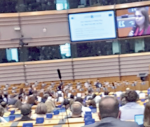Seeing front-page photos in newspapers or on television last week of Syrian families carrying overstuffed handbags and evacuating their virtually demolished neighbourhood in Homs, in central Syria, which has just entered the fourth year of a devastating civil war, was heartbreaking and overwhelming.
It reminded me of the adage, “a picture is worth a thousand words”.
Yet, it is outrageous to observe an event of this enormous magnitude without the Syrians, leaders or people, eagerly yielding to attempts to halt the civil war, which has so far resulted in 40 besieged communities and a quarter of a million people cut off from humanitarian aid for months.
The United Nations says some 9.3 million Syrians, or about half the country’s population, need crucial help.
More alarming is the possibility that the bloody events in Syria may encourage outsiders, reportedly the United States, to eliminate some of the combatants by drones, fearing that the turmoil may spread to neighbouring countries like Iraq and Lebanon.
Since the leaders of the uprising remain divided, several close neighbours, including Turkey, Iraq, Israel, Saudi Arabia and Qatar, are reportedly deeply involved in supporting one rebel group or another, if not concocting expansionist plans along common borders.
Despite the seemingly unyielding position of the Syrian government and the divided leaders of the opposition in this civil war that has cost the lives of over 130,000 Syrians, the initial steps taken by the UN have shown some minor positive results, thanks to the persistent efforts of Algeria’s Lakhdar Brahimi, the UN envoy.
Whether he can achieve additional gains may depend on his upcoming meeting with US Secretary of State John Kerry and Russian Foreign Minister Sergey Lavrov, who undoubtedly are eager for a solution.
In a joint op-ed in The Washington Post, President Barack Obama and visiting French President Francois Hollande reminded Syria that “our credible threat of force paved the way for the plan to eliminate Syria’s chemical weapons; now, Syria must meet its obligations”.
They added: “With the Syrian civil war threatening the stability of the region, including Lebanon, the international community must step up its efforts to care for the Syrian people, strengthen the moderate Syrian opposition, and work through Geneva II process towards a political transition that delivers the Syrian people from dictatorship and terrorism.”
No measure was spelled out by the two leaders; neither did they address the lethargic US-sponsored Palestinian-Israeli negotiations that have yet to yield any results.
Nevertheless, in a joint conference this week with the visiting French president, Obama underlined that Syria remains far from achieving its goal of halting violence and facilitating a political transition.
He described the situation on the ground as horrendous and said that the state of Syria is crumbling and it is bad for global security.
Obama is scheduled to visit Saudi Arabia soon. There he is expected to reassure the Saudi leadership that continuing talks with the Iranian regime would not affect US-Saudi relationship or tip the balance in the Middle East in favour of Iran.
At the same time, it is anticipated that the Saudis will urge the Obama administration not to forsake the Palestinians, who are facing an uphill battle with the rightist regime in Israel, which is eager to hold on to most of its illegal settlements on usurped Palestinian territories.
Former president Jimmy Carter and Robert A. Pastor, senior adviser at the Carter Centre on Conflict Resolution, also suggested last December in an op-ed in The Washington Post that an “important first step” for Syria is to create “a credible, independent, non-partisan election commission. A second important step is to build a security mechanism that would prevent any party from sabotaging the results”.
They also wrote: “We would need Russia and the United States to agree to this approach, Iran and other regional powers to stop supporting their proxies and the United Nations to elevate this issue to a top priority.”
Syria, a serious ally of Iran, may thus find the Tehran government’s steps, ingratiating it with the Western nations, may be worth emulating.
For example, Iran, after years of stonewalling, reported The Association Press “has told diplomats that it plans to cooperate this weekend with United Nations experts investigating alleged activities that it has steadfastly denied: work on nuclear weapons”.
The writer is a Washington-based columnist.













